Current as of: December 21, 2024 - 15:06
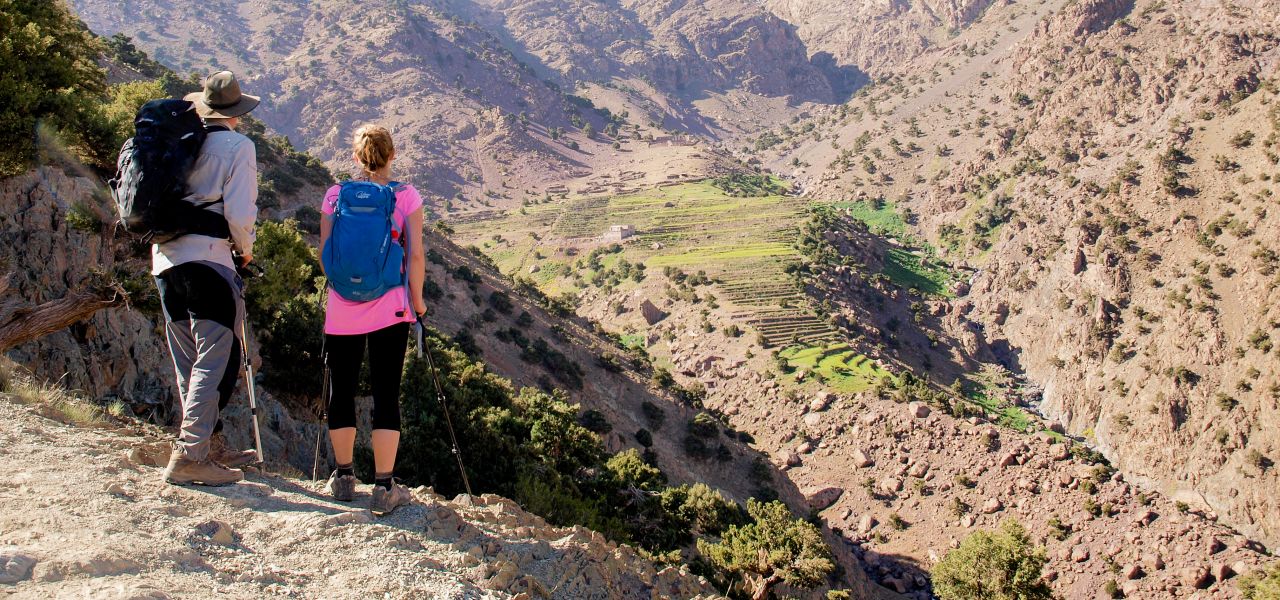
Undiscovered Atlas Trip Notes
- Ways to Travel: Guided Group
- Destination: Morocco
- Programmes: Walking & Trekking
-
Activity Level:
5 out of 7 - Challenging
- 8 Days: Land Only
- Ages: 16+
- Trip Code: TMA
- Carbon Footprint: 13kg CO2e
Trip Overview
Enjoy a remote trek among terraced valleys, desert oases and Amazigh villages
Embark on a fantastic winter trek in the dramatic, isolated Anti-Atlas Mountains of Morocco – camping wild as you go. You’ll marvel at kasbahs perched above terraced valleys and wide oases, and spot distant peaks fading into the desert haze. The ascent of Jebel Aklim (8,303ft/2,531m) provides wonderful views of the snow-covered High Atlas, while walking through small Amazigh villages brings you closer to the local people and their way of life. The trek ends in Taroudant, with time to experience the souks and ancient city walls.
At a Glance
- Accommodation: 2 Classic nights (hotels), 5 Simple nights (full-service wild camping)
- Five days of point-to-point walking
- Altitude maximum: 8,303ft (2,531m); average: 6,004ft (1,830m)
- Travel by private minibus
- Group normally 6 to 16, plus leader. Minimum age: 16
Highlights
- Experience a genuinely remote trek in the Anti-Atlas mountain range with a small group of like-minded adventurers
- Summit Jebel Aklim for views over the High Atlas peaks and extinct volcano of Jebel Siroua
- Walk through Amazigh villages with opportunities to meet and chat with the residents
- Camp wild in the mountains – our expert crew setting up the site for you
- Benefit from two leaders for all walking days for groups of 11 or more
Is This Trip for You?
This trip is rated Activity Level 5 (Challenging).For more information on our trip gradings please visit the Activity Level Guidelines page. If you have any queries about the difficulty of the trip please do not hesitate to contact us.
It includes five days of point-to-point walking with full porterage. The maximum altitude is 8,303ft (2,531m), with an overall average of 6,004ft (1,830m). This trek involves walking on rough trails and paths scattered with loose stones; some days are demanding although no great altitude is reached and there are no extreme temperatures to contend with. Frost is possible some nights, especially between November and February.
Hotel accommodation on this trip is basic, but clean and comfortable. Wild camping is without showers, but a basic toilet block is set up. Recently, authorities have been clamping down on wild camping, despite it being perfectly legal. Therefore, we may have to move to gites on some nights.
Morocco can get cold in winter though usually daytime temperatures are mild. Pack winter clothes for November through to March when nighttime temperatures, especially in the desert and the mountains, can drop considerably. During these months, there can also be rain throughout the country and snow in the mountains. As Morocco is generally mild to hot it is not set up for colder temperatures and so there may not be heaters available. Please pack winter clothes and nightwear to ensure you are comfortable. You can also ask for more blankets at the hotels. Please be prepared for the colder months.
Ramadan is expected to run from approximately from 28 February- 29 March 2025. One of the most important periods in the Islamic calendar, it is a special time to visit a Muslim country. Each evening, the streets empty as people head home to break the fast, followed by an air of festivity upon their return. Our leaders and drivers choose to work at this time so we continue to run trips; however, their energy levels may be slightly lower than normal. Many tourist sites, restaurants and shops will have an amended schedule, but your tour leader will know how to adapt the itinerary to still experience all the inclusions on this trip and maximise your experience during this special time.
Group
There will be a local leader, driver and local muleteers/guides throughout. A second leader will join the group for all walking days for groups of 11 or more.
Adult min age: 16
Min group size: 5
Max group size: 16
Itinerary

Land Only
- Start City: Agadir
- End City: Agadir
Land Only Itinerary
Fly to Agadir; arrival at our hotel in the evening.
Accommodation: Oasis Hotel & Spa (or similar)
The adventure begins in Agadir, a coastal city at the foothills of the Anti-Atlas Mountains. We join together at the hotel in the early evening for our welcome briefing. This is a great opportunity to meet the group and ask any questions you have.
Accommodation: Oasis Hotel & Spa (or similar)
From Agadir, we drive inland to Taroudant where we enjoy a brief tour, including time for a coffee on the square. We have lunch in the oasis of Tiout before continuing onto Ighrem, a copper town that has survived for centuries on a trade of pots and water urns with the Saharan caravans. It lies on a plateau near the Tizi’n’Touzlimt pass (5,970ft/1,820m), where the road to Tata and the desert landscape meets the Anti-Atlas range. Here we start our trek into the mountains towards our camping spot for the evening, Tagragra No. 1. Our camping spot is perched on a plateau, so the sunrise tomorrow is well worth an early night.
Accommodation: Tagragra No. 1 campsite (full-service camping)
Drive time: Two hours
We have a long first day as we climb over a col and then a series of spurs before entering a broad valley. After a picnic lunch, we continue past an abandoned mine towards the head of the valley, eventually reaching the beautiful village of Amal. Finally, we cross over a pass for the final stretch of today’s walk (in the beautiful evening light) to the village of Tagdicht. Here we camp on a traditional threshing platform that lies between the many agricultural terraces and is just outside a village at the foot of Jebel Aklim.
Accommodation: Tagdicht campsite (full-service camping)
Today is a steeper day’s walking. We climb Jebel Aklim (8,303ft/2,531m), one of the highest summits in the Anti-Atlas, for excellent views to the High Atlas and the extinct volcano of Jebel Siroua. The summit is reached via a high col and a series of spurs. Pausing for a scenic picnic lunch, we then descend to our camp at Tagragra No. 2. This area is one of the most remote in this range yet is still surrounded by Amazigh villages. During harvest, the valleys are full of brightly dressed women and children working in the field. We enjoy our picnic lunch on the summit of Jbel aklim,
Accommodation: Tagragra No. 2 campsite (full-service camping)
We travel from Tagragra through the wonderfully remote village of Irtem. Walking through these villages, we can chat with the Amazigh people, enjoy their friendly conversation (mainly through hand gestures and basic French) and gain true insight into their traditional way of life. We will enjoy a cup of mint tea with villagers. We arrive at our campsite close to the village of M’dint (City of Cats). Nestled in a valley of olive groves and trickling streams, the campsite is protected from the elements and provides a peaceful resting spot.
Accommodation: Lamdint-No-Oumouch campsite (full-service camping)
Leaving M’dint, we cross two cols, slowly weaving our way up the valley. The villagers are very friendly and, if we are lucky, we may get invited in to try mint tea and local delicacies. Passing through ancient olive plantations, we admire the irrigation channels before resting for a picnic lunch under the shady trees. Be sure to hunt out the small river for a soothing paddle! We work our way up the last pass of Tizgue for a steady uphill push, well worth it as we are rewarded with views of our entire route. Our campsite rests next to ancient argan trees and there is a natural series of rock pools where we can enjoy a swim and a wash as the sun sets.
Accommodation: Laainn-Tmaoiat campsite (full-service camping)
Today offers picturesque walking among date palms and through rocky landscapes. We walk along a dry riverbed (wadi) before arriving at Anammer village for our final picnic lunch. In the early afternoon, we transfer by minibus to Oulad Berhil. After check-in at our riad, there is the option to rest or make the journey to Taroudant (45 minutes) where we are free to explore the city, dubbed Marrakech in miniature. There is the chance to visit the souk for authentic Moroccan souvenirs or relax in one of the hammam steam baths before our farewell meal.
Accommodation: Riad Hotel l’Arganier d’Or (or similar)
Drive time: Three hours
Today we check out of our riad in Oulad Berhil and make our way to Agadir via Taroudant, where again there will be time to wander around and pick up any last minute souvenirs. Those on the group flights are taken to Agadir Airport in time for their flight, which is usually in the evening. For those not on the group flights, the trip ends in Taroudant. It is possible to join the group transfer to Agadir Airport with prior arrangement.
Today we check out of our riad in Oulad Berhil and make our way to Agadir via Taroudant, where again there will be time to wander around and pick up any last minute souvenirs. Those on the group flights are taken to Agadir Airport in time for their flight, which is usually in the evening. For those not on the group flights, the trip ends in Taroudant. It is possible to join the group transfer to Agadir Airport with prior arrangement.
Ascents, descents and distances: All ascents, descents and distances listed in the daily itinerary have been measured by our local partners or tour leaders, in many cases with satellite-based mapping software. However, different GPS measuring devices can give differing results, particularly on winding paths or in mountainous terrain. Measurements stated throughout these Trips Notes are given to help you understand the types of terrain and distances you will encounter. Timings stated will vary depending on the pace of your group.
Accommodation
Hotels and wild camping
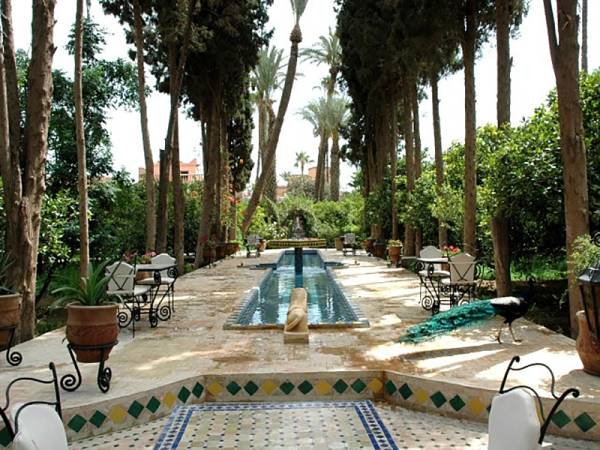
As we make our way through the Anti-Atlas peaks, we spend our nights wild camping, while our first night is spent in a hotel in Agadir and our final night is at a riad in Taroudant.
Agadir: Oasis Hotel & Spa (night 1)
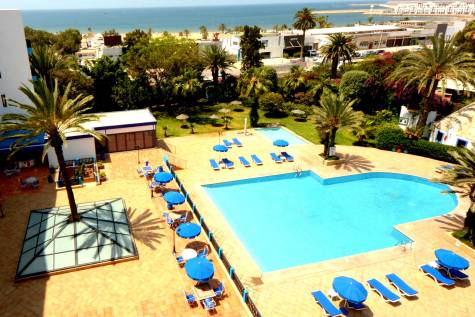
We begin our adventure at the Oasis in Agadir, where there’s a sandy beach and promenade within walking distance. The city centre is close too, for restaurants, cafes and markets. The hotel itself has a pool area with loungers, a bar, and a gym with plenty of machines.
Wild camping: (nights 2-6)
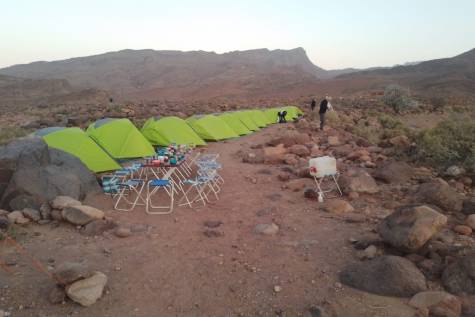
Our camping nights are a truly wild experience, as we sleep under the Moroccan sky, cradled by the Anti-Atlas Mountains. To make the experience a little more comfortable (while saving energy for the walks), the crew will go ahead of the group and set up our campsites. There is a toilet tent and larger tents for eating inside if the weather is not suitable for al fresco dining.
Taroudant: Riad Hotel l’Arganier d’Or (night 7)
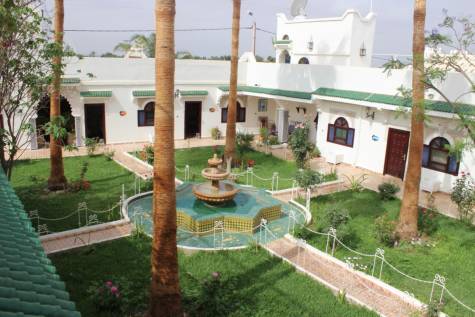
Built in 1992 on an orange farm, this riad is in the traditional Moroccan style. There’s a swimming pool, plus a patio and garden where you can relax with your new-found friends and chat about your adventure together.
Worth knowing
- Camping on this trip is always full service but in wild camps – official campsites do not exist in the areas we visit. Wild camping means there are no wash facilities or a toilet block. A basic toilet tent is put up at each camp. All camp chores are done for you, including building and dismantling your tent, cooking and washing up. A table and chairs are also provided for mealtimes.
Single supplement from £ 200
Accommodation - Pre Trip
Pre-tour accommodation available in Agadir on request.
Accommodation - Post Trip
Post-tour accommodation available in Taroudant or Agadir on request.
Food & Drink
All breakfasts, five lunches and five dinners are included on this trip.
Moroccan food is, generally speaking, excellent though not very varied. For meals not included, budget for the following approximate prices.
- Lunches: 60-100 dirhams (US$6-US$10)
- Dinners:
- In cities: 80-200 dirhams (US$8-US$19)
- In small towns and villages: 60-100 dirhams (US$6-US$10)
- Drinks in restaurants
- Soft drinks: 10-20 dirhams (US$1-US$1.90)
- Beer: 30-50 dirham (US$2.85-US$5)
- Wine: 150 dirham (US$14) and more
Where meals are included on the trek, expect the following to be catered.
Breakfast is likely to consist of a variety of breads with jam and other condiments plus tea and coffee, and porridge.
Lunch is usually plenty of salads, plus a hot dish and vegetables. Dinner is usually a variety of dishes that includes seasonal fruit and vegetables plus some meat and tinned fish and various rice, lentil and bean dishes. The choice tends to be large, so there is usually something for everyone. It is certainly not limited to cous cous and tagine and is often commented as a highlight of the trip.
Vegetarians can be catered for and there is usually a variety of bean/pulse dishes plus omelettes and vegetables. Please note, if you have special dietary requirements you should inform your sales representative prior to the trip. If you have a specific medical/dietary need (ie coeliac or vegan) you may find it helpful to bring some food items from home.
Drinking water
For the camping part of the trip, the leader will collect a small amount of money (around 40 dirhams) to purchase several large water containers from which you can refill your bottle. While individual water bottles can be purchased at the beginning of the trip, we strongly encourage you not to buy bottled water as this contributes to the growing problem of plastic pollution in Morocco.
Transport
We use a private bus, the size depends on the group size, with a local driver. Moroccan roads are reasonable and driving conditions in towns and on the plains are good. On mountain roads, the pace is slower. Although the buses normally have air conditioning and heating, this is not up to European/North American standards.
Weather & Seasonality
For winter treks, the days are usually warm (above 20C/68F) in Agadir and Taroudant while the nights can be cold, with temperatures dropping to 5C (41F). Rain cannot be ruled out but is unlikely to be prolonged. On trek, the days should be warm (15C-20C/59F-68F) with clear skies, but the nights are generally cold and sometimes drop below freezing. On the high ridges and summits there is often snow but not normally enough to stop us walking. Very occasionally, snow has been known at lower altitudes but it does not lie for long. For spring and autumn treks, the days are pleasant (20C-26C/68F-79F) in Agadir and Taroudant and the nights mild. Rain is infrequent. On trek, the days should be warm to hot (18C-28C/64F-82F with clear skies and strong sun) the nights will be cool (8C-18C/46F-64F). At this time of year, it is unlikely there will be snow on the higher ridges. Rain cannot be ruled out but is unlikely to be prolonged. Please note, mountain weather is always unpredictable and we may very occasionally be forced to amend the itinerary for part of the trek.
Joining Instructions
Key information
Start hotel: Oasis Hotel & Spa Agadir, Rue Granada, Agadir 80010, Morocco
Phone: +212 5288-43313
Recommended arrival time: Hotel check-in is from 2pm
Airport: Agadir Al-Massira International Airport (AGA)
The start hotel is approximately a 40-minute drive from the airport. Exodus provides free arrival transfers to the start hotel from the airport for all customers.
You should have a pen and accommodation details with you to complete the arrivals form.
If you would like further information on joining this trip, please speak to your sales representative.
Catching your return flight
Exodus provides a transfer for the group flight to Agadir Al-Massira International Airport (AGA) from the end hotel in Taroudant. You can join the group transfer by prior arrangement. If you’re not taking the Exodus transfer, allow three hours for check in, bag drop, immigration and security. The airport doesn’t accept mobile boarding passes, so take a printed boarding pass to avoid further delays.
Please note, unless specified otherwise, the transfers will be to the start (or pre-tour) hotel and from the end (or post-tour) hotel and will be on the date on which the tour starts/ends; transfers to other hotels in the same city and/or on different dates may attract an extra charge. Transfers should be booked with your sales representative at least two weeks before the tour starts.
Full joining instructions including local emergency numbers will be sent to you as part of our Final Joining Instructions. If you do not receive these at least a week before departure, or require them earlier please contact our office or your travel agent.
Location start: Agadir
Location end: Agadir
What To Take
Essential Equipment
- Four-season sleeping bag – it can get very cold at night!
- Warm trousers (pants)
- Long-sleeve thermal top and thermal underwear
- Hiking boots with good ankle support
- Backpack for the daytime
- Warm hat and gloves
- Sunglasses
- Sunscreen
- Waterproofs
- Toilet paper
- Towel
- Torch (flashlight)
- Comfortable footwear for the evening
- Reusable water bottle
For November to January departures, we also recommend:
- Fleece jacket
Although Morocco is a Muslim country, the dress code in the large cities is not as strict as it used to be, so it is fine to wear shorts and tops with no sleeves. When entering mosques and in more rural areas it is advisable to be more modest and wear, for example, clothing that covers the knees and shoulders. Additionally, women should avoid wearing revealing clothes.
Exodus kitbag: If you book this trip, we provide a free Exodus kitbag to pack your luggage in while on trek. Once you have booked, you will be sent instructions on how to claim your bag (they are not sent automatically). Please note, if you book less than three weeks before the departure date, we cannot guarantee your kitbag will arrive before your trip starts. If this is the case, please contact us on customerops@exodus.co.uk (or customeroperations@exodustravels.com if you’re based in the US or Canada). See www.exodus.co.uk/kitbags for full T&Cs.
Environmental considerations: We believe in reducing our negative environmental impact wherever possible, even when nature calls. If no facilities are available, you may need to go behind a tree, bush or rock. To avoid leaving toilet paper behind, we recommend taking biodegradable bags with you. Once you have done your business, put the used paper in the bag and dispose when appropriate facilities are available.
Optional Equipment
- Walking poles
Practical Information
Visa
Morocco
Travellers from the UK, US and EU normally do not need a visa to enter Morocco. Please note, visa requirements often change and it is your responsibility to obtain any required visas for this trip. Therefore, we recommend that you check with the nearest embassy or consulate of your chosen destination(s), including any countries you may be transiting or transferring through.
Some local governments provide guidance on what visas their citizens need. To help, we’ve gathered a selection of useful links below.
• Australia: www.smartraveller.gov.au/destinations/africa/morocco
• Canada: www.travel.gc.ca/destinations/morocco
• United Kingdom: www.gov.uk/foreign-travel-advice/morocco/entry-requirements
• USA: www.travel.state.gov/content/travel/en/international-travel/International-Travel-Country-Information-Pages/Morocco.html
Vaccinations and Health
Morocco
There are no required vaccinations. However, you may want to consider vaccinations for tetanus, hepatitis A, hepatitis B, rabies, tuberculosis and typhoid. A polio vaccination certificate may be required for some travellers. Please confirm your needs and requirements with your doctor or travel clinic.
Bilharzia is known to occur in some of the lakes or rivers visited on this itinerary, we therefore advise all to take advice from your guide or leader locally before venturing for a swim.
Local Time
Morocco's time zone: Africa/Brazzaville (UTC +01:00)
Electricity
Morocco's electricity: Plug types C (two round pins, European standard) and E (two round pins) – 220V, 50Hz
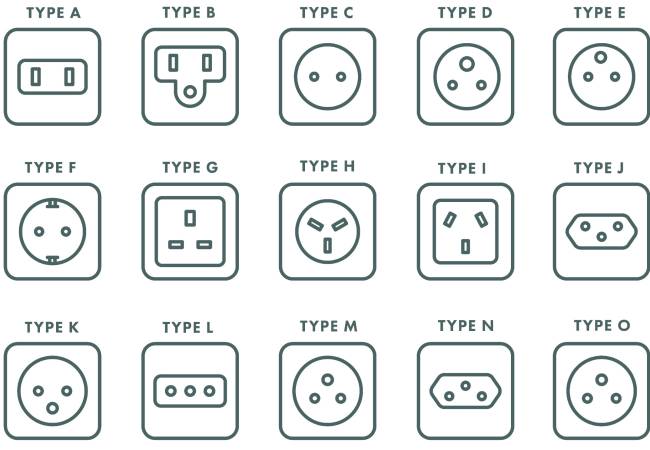
Money
Morocco's currency: Moroccan dirham (MAD), a non-convertible currency. You can only import/export a maximum of 2,000 dirham to or from Morocco.
ATM Availability
It is easy to use Visa/Mastercard at the ATMs, which are only available in larger towns and cities. Credit cards are normally accepted for more expensive souvenirs, such as carpets (but shops may charge a 5% supplement for this).
Extra Expenses & Spending Money
We recommend you change your money at the airport into the local currency, as Morocco only allows 2,000 dirhams to be imported or exported. There is no limit on the amount of foreign currency you take. When changing your money, ensure you keep hold of your exchange receipt as you may need to show it at the airport bank at the end of your trip where it’s normally possible to change any unspent dirham notes back into euros, British pounds or US dollars. Allow approximately 30-70 dirhams (US$3-US$6.50) per day to cover postcards, small souvenirs, soft drinks etc. See the eating and drinking section for more details on expenditure.
Tipping
Our local staff are paid well and fairly for their work and tipping is at your discretion for both the leader and the local staff. However, tipping is part of the local culture and generally expected. If you do wish to tip, we have found it useful for the group to have a tipping kitty – about 250 dirhams (US$24) per person, this can ease the confusion and embarrassment of not knowing how much to tip staff (such as drivers, cooks and guides). If you do not wish to join the group kitty, do not feel pressured. Many clients also wish to tip their leaders at the end of the trip, we suggest 30 dirhams (US$3) per person per day. This is completely at your own discretion and to be used as a guideline only.
Sustainability and Impact
At Exodus, we thrive on travel, and we firmly believe our adventures should help destinations thrive too.
As a certified B Corp, we aim to take a ‘nature positive’ approach across our adventures, including carbon and waste reduction, animal welfare and support for rewilding and conservation. We also seek to contribute to local communities, providing economic opportunity and empowerment.
-
Learn more about our Thriving Nature, Thriving People plan, including our commitment to rewilding 100 square metres for every Exodus traveller
-
Read about the work of the Exodus Adventure Travels Foundation.
-
Find out how you can travel more sustainably here.
Important Information
Water safety
This trip includes time by a lake, river or sea, where there may be opportunities to swim. You should always seek local advice before deciding whether to swim. Open-water or wild swim spots should be treated with extreme caution. Information on how to keep yourself safe while swimming is shown here.
Important Information
Your safe participation
When booking this trip, you should be confident in your ability to participate in all activities described in these Trip Notes. If you have any doubt about your suitability, please call the Exodus office and ask to speak to one of the experts on this itinerary.
Although our leaders are well trained to deal with different capabilities, if they have any concerns about someone’s ability to safely take part in an activity, or their impact on other people’s enjoyment, we authorise them to take necessary action which, in some circumstances, may involve asking someone to miss that activity.
By booking this trip you agree to our Booking Conditions which clearly state that our leaders have the authority to do this. In these rare instances we will ensure anyone sitting out is safely provided for and offered alternative options where possible. Refunds will not be provided for activities missed and customers may be liable for additional costs incurred.
Seatbelts
All vehicles used by Exodus should be equipped with working seatbelts, except where approved by Exodus based on the vehicle type or journey. Wherever seatbelts are available, we require our customers to use them for their own safety, even where it may not be a legal requirement.
How to Book
- Check availability: Go online to check availability, or contact us by phone or email.
- Secure your place: You can provisionally hold a place on this trip, usually for between three and seven days.
- Complete your booking and payment
When you’re ready to book, go to our website for online bookings, book over the phone or you can complete a booking form (available online or on request by calling us). We accept all major credit and debit cards, or you can pay be cheque.
After booking
You will receive your booking confirmation letter and invoice, which includes extra information and guidance about your travel arrangements.
Full joining instructions, including local emergency numbers and details of how to reach the start point, will be sent to you approximately two to three weeks prior to departure. If you do not receive these at least a week before departure, or require them earlier, please contact our office or your travel agent.
Trip Note validity
These Trip Notes are valid from the “Current as” date on page one. They will occasionally be updated after booking and before departure; if there are any updates that significantly impact the inclusions or itinerary, customers will be written to separately. They will also receive a link to the most up-to-date Trip Notes with their Final Joining Instructions before travelling.
The information in these Trip Notes is given in good faith. Where differences exist between the Trip Notes and our current brochure or website, the Trip Notes supersede the brochure and website. All holidays can be subject to unexpected changes; to enjoy them you should be prepared to be flexible where necessary. Occasionally, it may not be possible to follow the itinerary as planned. This may be for a variety of reasons – climatic, political, physical or other. In these circumstances we will make the best-possible alternative arrangements that maintain the integrity of the original itinerary.
Licensing
Exodus is fully licensed and bonded as a tour operator. We hold Air Traffic Organisers Licence (ATOL) number 2582, issued and bonded with the Civil Aviation Authority (CAA). We are also bonded to the International Air Transport Association (IATA) and we are members of the Federation of Tour Operators (FTO) and ABTA – The Travel Association. This means you can book your Exodus holiday with confidence, as all money paid to us for your trip is fully protected.